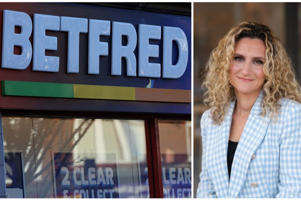
© Dr Ellie Cannon / GDST / Newcastle Chronicle Dr Ellie Cannon has spoken about the harms of stigma around gambling addiction
Gosforth-born TV doctor Dr Ellie Cannon has backed a campaign urging gambling addiction to be treated as a public health issue – while an addict told how the “shame and stigma” led to mental health problems.
Charity Gamble Aware is urging for a change of approach when it comes to the addiction. The organisation’s campaign highlights how three quarters of those experiencing problem gambling feel they can’t talk to loved ones about it.
The figures also show that one in four of people know someone with a gambling problem. The charity is fighting to tackle stigma around the addiction, as that stigma can cause even greater harm.
Read more: Labour lose seats in Newcastle but remain dominant force – as council leader prepares for challenge
Dr Ellie Cannon – a GP based in north London but brought up in Newcastle – said: “As a GP, I’ve worked with patients who are seeking support for gambling harms, so I understand how they can manifest for an individual in incredibly challenging ways, not dissimilar from other conditions such as alcohol or drug misuse.
“With stigma preventing so many vulnerable people from seeking support, it is time for society to challenge its outdated attitude towards gambling harms and those who experience them with stigma being the biggest barrier preventing people from opening up.”
One North East gambling addict – speaking anonymously – told ChronicleLive how gambling and the associated stigma led to mental health problems and relationships breaking down. He said: “The stigma that exists around gambling left me feeling ashamed and unable to speak to others.
“It prevented me from seeking help as I didn’t want to acknowledge it had become a problem, and many don’t recognise gambling harms as a health problem like they might drug or alcohol misuse. I kept my gambling hidden and felt like I had no one to turn to and there was no way out, and I began experiencing suicidal thoughts.”
The man added that he had dealt with kicking an alcohol problem by turning to gambling – and that when he tried to open up about his issues, his relationship fell apart. He added that it had weighed on “every part of my life”.
“I began to feel isolated and alone, experiencing mental health problems, seeing my relationships with my family and loved ones break down,” he said. “It was a very dark time. It was a constant struggle to try and continue with normal life while gripped by a gambling addiction.”
But the man said that support groups like Gamblers Anonymous had helped turn his life around – and that he felt it was vital to challenge the “dangerous stigma” around gambling.
This is echoed by Dr Dame Clare Gerada, President of the Royal College of GPs. Dr Gerada said: “Gambling harms are a serious public health issue and can affect anyone. They can manifest in various ways, including mental or physical health issues. General practitioners and the wider health sector can play a crucial role in addressing the issue of gambling harms, by supporting those who experience the harm directly.”
Zoë Osmond, chief executive of GambleAware, added: “Gambling harms can affect anyone, which is why it is so important that we break down the stigma associated with it and encourage people to come forward and talk about gambling harm. It’s about time we put an end to stigma and opened up the conversation about gambling.”
Anyone concerned about their gambling can search GambleAware for free, confidential advice, tools and support or the National Gambling Helpline is available on 0808 8020 133 and operates 24 hours a day, seven days a week.
READ NEXT